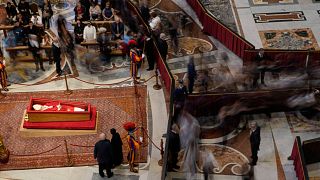Coastal management
Drownings in Senegal's capital city Dakar have spiked this year as residents flock to beaches to take a dip in the Atlantic waters during periods of hot weather.
In the first six months of 2021, 48 people have drowned in the Dakar region, four more than over the same period last year.
Since mid-June, authorities have stepped up surveillance and prevention.
But as soon as the police officers leave, the youngsters hop back into the ocean.
Amongst beach-goers, not everyone is pleased with such a police presence.
"We come here often but not to bathe. We come to unwind, to relax, to clear our heads, but not to bathe because it's forbidden. The other day, there were about 10 deaths, it's very dangerous. Since that day, the police often come here to monitor the area. It's strictly forbidden" says Moustapha Diagne, a 22-year old student.
But Libasse Diagne doesn't share his view.
"We only have this beach to pass the time and to swim. The police should leave us alone here and go and watch the beaches on the other side. That's all we ask."
Grande Côte
Most of the deaths occur along the first several kilometres of the so-called Grande Cote, which runs from the tip of the Dakar peninsula to the border with neighbouring Mauritania.
This coast is buffeted by the rough Atlantic Ocean, but the sheltered shoreline south of the peninsula, known as the Petite Cote, has calmer waters and is popular with tourists.
Dakar fire-brigade officer Abdoulaye Ndiaye said that on calmer parts of the city's northern shoreline, pools can form.
But waves breaking at high tide create a depression in these pools, he explained, "that pulls the victims out to sea".
Lifeguards are usually on duty only on beaches in Dakar where swimming is permitted, leaving bathers on many northern beaches unsupervised.
Eight people drowned during one weekend alone last month, sparking nationwide concern.
Most people of the city of over 3 million cannot swim, as lessons are expensive, and many ignore swimming bans on beaches that are subject to lethal rip tides.
Authorities now fear the months of July and August, as young people rush for the sea to escape the heat.
Aida Sow Diawara is the mayor of Golf-Sud, a locality South of Dakar. She expresses her concern, as the number of casualties keeps growing.
"We already have 39 drownings. You see, when the holidays start after the exams, the children will be free, so no one will be able to hold them back, and they will go to the beach. We really need to find a solution," she told AFP in June.
Are beach privatisations at fault?
Ibrahima Fall is the president of the Senegalese lifeguards' association. He blames the drownings on the rash beach privatisations, as hotels and restaurants mushroom along the coast of Dakar.
"People are forced to fall back on to the Grande Cote and these beaches are dangerous," he said, referring to the shoreline north of Dakar.
"The so-called authorised beaches have already been privatised. So people are forced to go to the main coast and these beaches are dangerous," Fall added.
Authorities hope to curb drowning figures and secure the coast of Dakar, that has already been dubbed by Senegal's local press as the "death beaches".











01:09
NGOs sue Spain for ignoring illegal fishing threat to African coasts
01:40
‘The Herds’ puppets highlight climate change in Lagos
00:58
Senegal: MP Proposes High Treason Charges Against Former President Macky Sall
04:22
African nations shine at Special Olympics Winter Games
11:32
New discoveries: Ocean census project reveals over 800 new species of ocean life
04:13
The fight for justice: Amnesty International on Senegal's protest crisis